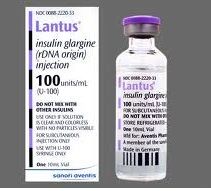Sanofi-Aventis Lantus Insulin for Cats By Sanofi-Aventis (3-15 ml)
Lantus Insulin is an injectable medication used to control diabetic patients' blood sugar levels. Your veterinarian has chosen this product to most closely match your pet's natural insulin. Multiple types of Insulin exist, so make sure you match the right type of syringe to your Insulin. Insulin requires refrigeration; all orders must be shipped overnight.
For:
Cats
Benefits:
Lantus insulin helps control high blood sugar levels by providing insulin regulation by helping patients properly metabolize sugar.
Active Ingredients:
insulin glargine
Cautions:
This medication does not have an FDA approved indication for use in animals, but it is a common and acceptable practice for veterinarians to prescribe this human medication for use in animals. Make sure to tell your veterinarian what other medication or supplements you are giving your pet. Dietary changes may also affect insulin requirements. Quite often your veterinarian may prescribe two different medications, even if a drug interaction may occur. In this case, your veterinarian may vary the dose and/or monitor your pet more closely. The following drug interactions that may occur with insulin include: Beta-adrenergic blockers, clonidine, resperidine, and digioxin. Drugs that may increase hypoglycemic activity of insulin (resulting in low blood sugar) include: captopril, enalapril, alcohol, anabolic steroids, beta-adrenergic blockers, MAOI's, guanethidine, phenylbutazone, sulfinpyrazone, sulfonamides, tetracycline, and aspirin, or other salicyclates. Drugs that may decrease hypoglycemic activity of insulin (resulting in high blood sugar) include: epinephrine, estrogen/progesterone combinations, furosemide, glucocorticoids, isoniazide, phenothiazine derivatives, thiazide diuretics, and thyroid hormones. Serum potassium levels can fluctuate in combination with digoxin and insulin and additional monitoring may be needed. Contact your veterinarian if your pet experiences any unusual reactions when different medications are given together.
Allergic reactions to medications may occur. Be sure to inform VetSource and your veterinarian if your pet has any known drug sensitivities or allergies. If your pet displays symptoms of an allergic reaction, call your veterinarian immediately or go to a veterinary emergency clinic. Symptoms may include but are not limited to: swollen lips, tongue, face, airways; difficulty breathing; agitation; profuse salivation; vomiting; widespread hives and itching.
Side Effects:
Side effects may include hypoglycemia. Signs include hunger, nervousness, vocalization, anxiety, muscle tremors, ataxia, and papillary dilation. If there are signs of hypoglycemia, offer the pet some food or oral dextrose. Positive response should occur within one to two minutes. Prolonged hyperglycemia can result in seizures, coma, and death. Severe hypoglycemic signs require prompt veterinary intervention. Other side effects may occur. If you notice anything unusual, contact your veterinarian.
Usage:
Lantus insulin should be administered as directed by your veterinarian. Your veterinarian will determine the correct dose of insulin need for your pet by means of a blood glucose test. Follow your veterinarian's instructions as doses may vary over time. Injections should be given subcutaneously, just under the skin. Be sure to rotate injection sites to prevent skin problems at the injection site. Pinch a fold in the skin to create a small space for the needle. Insert the needle into the center of the fold as instructed by the veterinarian. Inject the drug by pushing the plunger as far as it will go. Withdraw the needle and be careful to not stick yourself. Dispose the needle immediately in a proper sharps disposal container.


